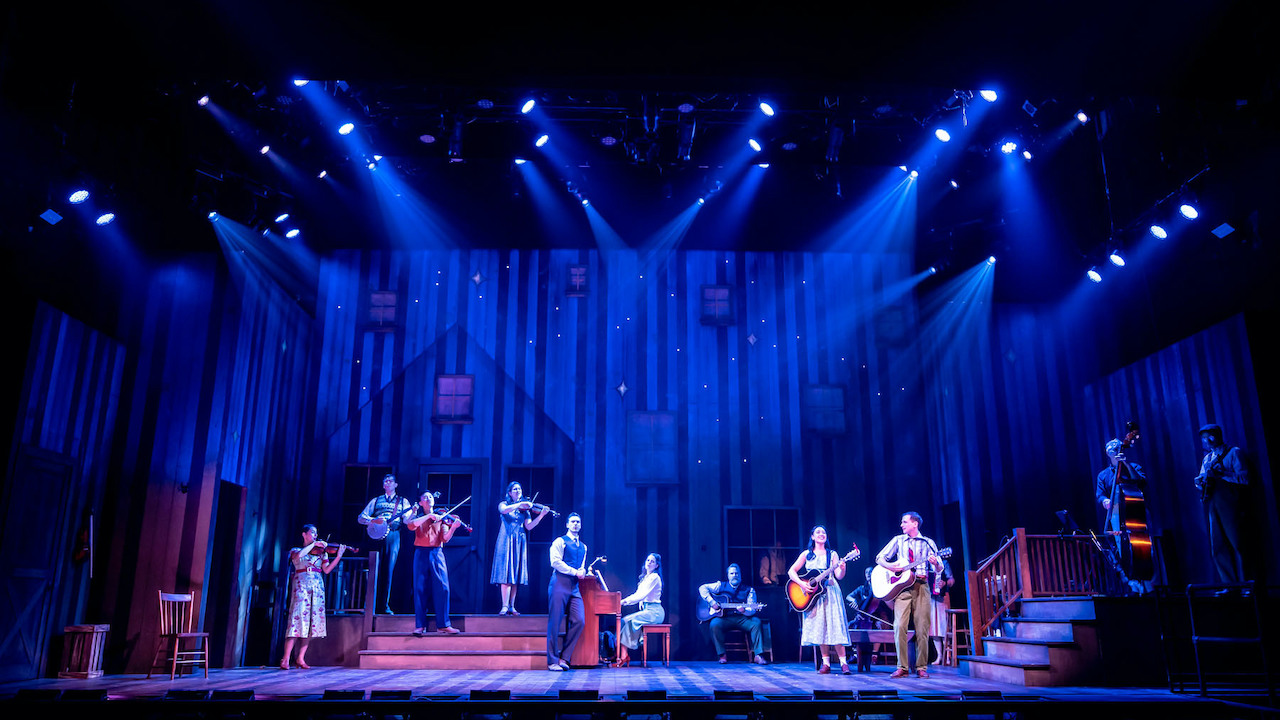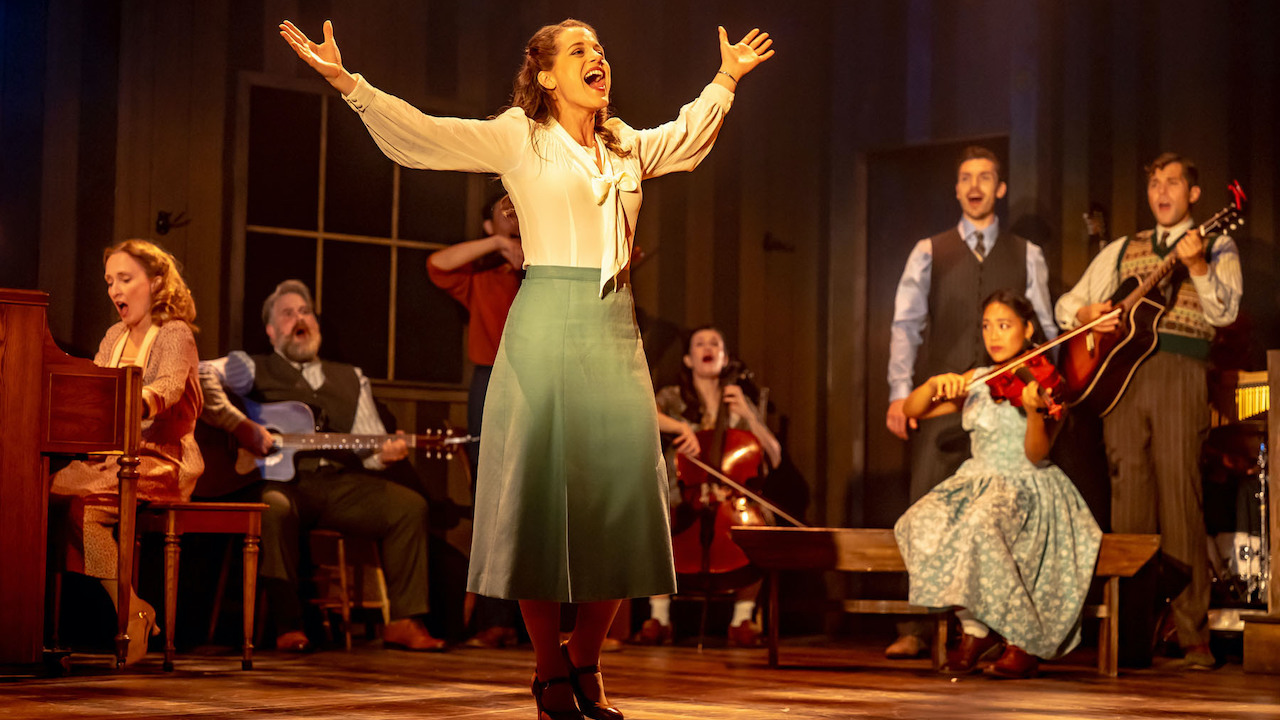During the opening scene of the new all-Canadian Mirvish production of Bright Star, music flows — though not from the usual orchestra hidden below. Instead, it’s the actors milling about onstage, instruments in hand, who regale the audience with the chords of opening song “If You Knew My Story.” It’s a spectacular introduction to the magic of an entirely actor-musician show; performers seamlessly swapped off mid-song while playing the piano, while others switched from station to station (cleverly positioned by set designer Brandon Kleiman) across the stage, picking up a bow and fiddle one moment and strumming on a guitar the next.
Written by Steve Martin (the comedian also happens to be a proficient banjo player) and Edie Brickell, Bright Star’s Grammy-nominated country and bluegrass score seems like it was always meant to be adapted to an actor-musician ensemble.
“That unique blend of artist who is the player on stage in every sense of the word, embodying the character with the instrument in our hands, the power of the story on our lips and the joy of movement fused with our musicianship,” is how Donna Garner, artistic director and founder of the production company behind this show, Garner Theatre Productions, describes the actor-musician in her playbill introduction.
In this case, these hybrid performers more than enrich the story. Set in North Carolina in two different timelines — 1945, just after World War II, and 1923 — we meet aspiring writer Billy Cane (Nick Dolan), home from serving in the war. He brings his stories to Alice Murphy (Kaylee Harwood), literary editor at The Asheville Southern Journal who cheekily name drops Carl Sandburg and Tennessee Williams as promising new authors looking to submit to the Journal. Alice sees something in the eager Billy, and pays him a small sum to encourage him to keep writing.
We’re then taken back to 1923, in Alice’s small hometown of Zebulon. Harwood plays the transition from the no-nonsense editor Miss Murphy to the barefoot, carefree and cheeky Alice in love with the mayor’s son Jimmy Ray Dobbs (George Krissa) with ease.
The story here, like much of Bright Star, hits some familiar beats: Alice and Jimmy’s love is somewhat of a star-crossed affair, with Jimmy’s father, Mayor Josiah Dobbs (Brendan Wall) staunchly disapproving of the relationship and attempting to set his son up with some more, ahem, economically favourable matches. Alice’s ultra-religious father passes judgement on her every move; the somewhat heavy-handed lyrics to “Firmer Hand/Do Right” refer to Alice as the “black sheep” and “lost little lamb,” with Mama Murphy (played by Garner) at one point repeating “shame, shame, shame on you.”
Back in the 1940s, the two timelines start to intertwine in some not-so-surprising ways, to anyone who has ever watched a made-for-TV Hallmark movie. But an otherwise predictable storyline is made heartfelt and compelling by strong performances. Harwood is mesmerizing as Alice — one harrowing sequence sees her pivot from the sweetness and hope of “I Can’t Wait” to the raw and emotionally wrought “Please Don’t Take Him” with breathtaking finesse that had me shedding a tear.
The entire cast was similarly a delight; Yunike Soedarmasto plays Billy’s longtime friend Margo, who pines for him, and her line deliveries and physicality on stage had the entire theatre laughing. Marie Mahabal Hauer and Jonathan Gysbers as Alice’s employees Lucy and Daryl also brought some comedic relief to the story, including a show-stopping number by Mahabal Hauer (“Another Drink”).

It’s no simple feat to tell a story — especially one that crosses multiple timelines — with violins and guitars in hand, but the production’s creative team makes it look easy. The instruments are (pardon the pun) instrumental in this version of Bright Star, and it’s clear the creative team worked with, instead of around, them. Director Jacob Wolstencroft handled each scene with care, and choreographer Lisa Goebel managed some clever choreography to get the musical balance just right. Jason Hand’s work as lighting designer also stands out, playing with shadows and spotlights to direct the audience’s attention even when all 14 musicians are on stage at once for a number.
Whether you’re normally a fan of musicals or not, the fun of watching Bright Star is in the details: catching Beau Dixon (playing Daddy Cane) using a briefcase as percussion; noticing one character hand off the piano to another just before their solo; seeing Soedarmasto loop a guitar strap around her shoulder mid-scene before her big number. Bright stars, indeed.
Bright Star will play at CAA Theatre until Nov. 2.




![10th Oct: My Father, the BTK Killer (2025), 1hr 34m [TV-MA] (6/10)](https://occ-0-171-92.1.nflxso.net/dnm/api/v6/Qs00mKCpRvrkl3HZAN5KwEL1kpE/AAAABfQibVNvSJ-DF8zX4z113uTtLWwNgm_WI-lckZecpUq4ZhTw1zHRy6-6gUu2r-xKwy9CcHPEaRZIP9CI4yq7fcDzPtWTujpq2bjHIO_iYO4iEkDx-zh15ViSAXrStpYyxW4SYUvqUnpwaUz_miYtb6p4FBQRwpSmNUeU_jDy4qcTbQ.jpg?r=bc7)











